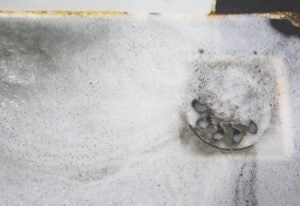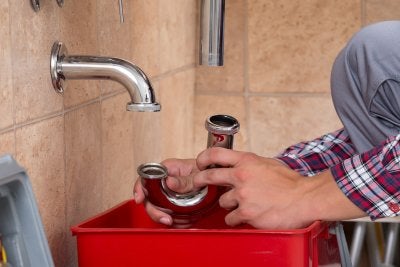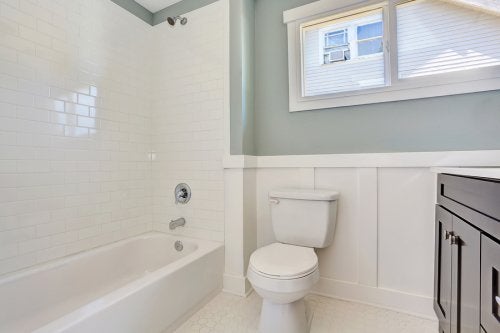-
How to Prevent a Clogged Shower Drain?
Dealing with Drain Clogs
Drain clogs happen, but they are certainly not pleasant. No one enjoys stepping into the shower, hoping for a relaxing, spa-like experience, only to find that dirty water is pooling around their feet because the drain is clogged. Plumbing a shower drain is tedious, but you do not have to be stuck in that position. In fact, one of the best tips for plumbing problems of all kinds applies to a clogged shower drain as well: the best way to deal with it is to be proactive in preventing it. Here, we offer tips for how to unclog a shower drain, along with maintenance tips to keep your drain from clogging in the first place.
What Not to Do for a Clogged Drain
 If your shower drain is currently clogged, you probably don’t want to read through preventive maintenance tips before learning how to unclog it, so we’ll get right to it. First, let’s talk about what not to do. Never use harsh chemical drain cleaners like Drano or Liquid plumber, and do not try to clear your drain with a wire clothes hanger. Doing any of these things can damage your bathroom plumbing, and lead to a much larger problem! Instead, try flushing your drain with boiling water, or vinegar and baking soda. If that is not successful, try using a plunger, removing the drain cover and centering the plunger over the drain. Run a little bit of water to create a seal under the plunger, and then push the plunger up and down several times to try and dislodge the clog. If you cannot safely fix the problem using one of these methods, it’s time to call a plumber.
If your shower drain is currently clogged, you probably don’t want to read through preventive maintenance tips before learning how to unclog it, so we’ll get right to it. First, let’s talk about what not to do. Never use harsh chemical drain cleaners like Drano or Liquid plumber, and do not try to clear your drain with a wire clothes hanger. Doing any of these things can damage your bathroom plumbing, and lead to a much larger problem! Instead, try flushing your drain with boiling water, or vinegar and baking soda. If that is not successful, try using a plunger, removing the drain cover and centering the plunger over the drain. Run a little bit of water to create a seal under the plunger, and then push the plunger up and down several times to try and dislodge the clog. If you cannot safely fix the problem using one of these methods, it’s time to call a plumber.Simple Steps for Clearing a Drain
In the future, though, you can prevent a clogged shower drain by following these tips:
- Brush your hair. Did you know that most clogs in shower plumbing happen because of hair in the drain? When this hair combines with soap, conditioners, body oils, and other products, it can create a sludgy mess that sticks in your pipe. One simple step towards fixing this is to brush your hair before showering. This will remove loose hairs so that they don’t go down the drain when you take your shower.
- Use a mesh hair trap. This is another way to keep hair out of the drain. These traps fit over the drain and catch hair before it can go into the plumbing. Then you simply remove the hair from the trap and throw it away. If this job seems gross to you, wear gloves. It’s well worth handling some wet hair to save yourself some plumbing headaches.
- Keep oily body products out of the shower. We realize this one is tricky, because many body products contain oil, from conditioners to lotion to sugar and salt scrubs. However, oil can harden in your pipes, creating the perfect environment for clogs to form. It is a good idea to apply your oil based products outside of the shower and wipe off as much as possible before getting in or use them after you get out of the shower.
- Don’t dump buckets down the drain. If you mop your floor or do some other dirty chore that involves a bucket of water with cleaners in it, dump these somewhere other than your shower drain. Not only can the chemicals be too harsh for the drain, but dirt and debris in the bucket can result in a clog. One interesting idea is to pour dirty water into cat litter, then throw this away. This keeps contaminants not only out of your plumbing, but also out of the soil around your home.
- Regularly flush the drains. First, when you are finished with your shower, let the hot water run down the drain for a few minutes, to help move stray hairs and body products through the pipes. Then, once a week, flush the shower drain with boiling water, taking care not to splash yourself with boiling water. From time to time, especially if you notice that your shower drain is running a little bit slowly, do a vinegar and baking soda rinse. This is a simple process: just pour one half to one cup of baking soda into the drain, following it with one cup of white vinegar. Let this mixture foam for 10 to 15 minutes, then follow it with about a gallon of hot water.
Tough Clogs Require Expert Help
Sometimes, despite your best efforts, you encounter a shower clog that is beyond what you can manage. When that happens, call a reliable plumber. For over half a century, Eagerton Plumbing has been a leading provider of residential and commercial plumbing services in Jacksonville, Florida, and the surrounding areas. Customers in Duval, Clay, Nassau, and St. Johns counties know they can rely on us not only for comprehensive plumbing services, but also for slab leak detection and repair, kitchen and bathroom remodelling, and more. No job is too big or too small, and we are here for our customers 24 hours a day, 7 days a week, offering exceptional customer service and reliable repair services, backed by service guarantees. All of our experienced plumbers are licensed, insured, and background checked, and we are committed to getting the job done right the first time, customizing an affordable solution to meet your needs and solve your plumbing problems. When you need a reliable plumber, any time of day or night, call 904.638.7979 or contact us through our website.
-
Tips for Keeping Your Drains Clear
When you have a severely clogged drain in your home, you may find yourself calling up your plumber to schedule emergency repairs. Rather than waiting for an emergency to schedule plumbing repair for your system, you may want to take proactive steps to help avoid clogs in the first place. Your plumber serving Jacksonville can provide you with the information that you need to keep clogs away from your drains. If you are wondering how to prevent clogs in your home’s plumbing system, read on for some essential tips for keeping your drains clear.

Run Hot Water After Each Use
One of the most essential steps for keeping your drains clear is to take basic steps to eliminate clogs from forming in the first place. After each time that you use a sink or other plumbing fixture that contains a faucet and drain, you will want to run hot water through the system. The hot water will naturally remove buildup and grime, thereby helping to prevent clogs from developing in your drains.
Purchase Quality Drain Screens
Drain screens are your plumbing system’s best line of defense against clogs. The role of a drain screen is to catch hair, soap scum, and other particles, while still allowing the water to properly flow down the drain. Without a drain screen, you may find that your drains develop clogs very quickly. If some of your drains do not currently have screens, be sure to talk to your plumber about the possibility of having new screens installed.
Use Natural Cleaning Solutions
While chemical drain cleaners can cause significant damage to your entire plumbing system, there are some natural remedies that you can use to remove minor clogs. Baking soda, for example, can be used to flush away small clogs in your system. If you have started to notice that your drains are running more slowly than usual, you may want to consider a baking soda treatment. In the event that baking soda cannot clear the clog, you will know that it is time to contact your plumber.
-
What to Do About a Clogged Toilet
There are many types of problems you might deal with when it comes to your plumbing system , from broken water heaters to leaky faucets. Some problems are more serious than others, however, and some you can even handle on your own. If you don’t want to take the time to call your plumber serving Jacksonville to deal with a clogged toilet, consider taking on the task yourself; although it may not be the most glamorous task, it’s not the most difficult either. Take a look ahead to find out what to do about a clogged toilet.
Aside from calling your plumber, you have 3 options when it comes to clogged toilets. The first option is the lazy option: wait a while to see if the water in your toilet has broken down the clog. If another flush doesn’t do the trick, the second option is to try your plunger. Center the rubber part of your plunger over your toilet and push straight down, then pull up. If the plunger is no use either, the third option is to try using an auger. You can use the pointed part of the auger to break through the obstruction and pull it back out of the toilet; just make sure you have gloves.

-
Keeping Your Drains Clear
Preventing Clogged Drains
Clogged drains are one of the most common plumbing problems that homeowners face. There are, however, steps you can take to avoid having to call a plumber to unclog a drain in your home. Watch this video to hear about how you can prevent the need for a costly plumbing repair in Jacksonville.
To keep your drains clear, you should be very mindful about what you place down them. By keeping food particles, hair, grease, oil, and foreign objects out of your drains, you can stop clogs from impacting your plumbing system. You should also run hot water down your drains about once every week to clear soap scum and other residue that might build up inside of them. When you take these precautions, you won’t need to worry about calling a plumber to fix a clogged drain or do a new drain line installation.
-
Preventing Kitchen Sink Clogs
The drainpipe attached to your kitchen sink is designed to remove wastewater and tiny food particles from the home in a quick and efficient manner; if you misuse this fixture, however, you will soon find yourself calling your plumber in Jacksonville for repairs. Watch this video clip for a few tips on preventing kitchen sink clogs.
The best way to keep your kitchen sink from clogging is to be cognizant of the way you use it. While the trap in your sink helps you catch food scraps as you clear your plate after dinner, it is up to you to remember to empty the trap so that the scraps do not make it to the sewer. Never pour coffee grounds or grease down the drain, as these materials will quickly build up and cause clogs. Be sure to properly dispose of your food scraps; consider recycling or composting them.
-
Identifying the Signs of a Sewer Clog
Your sewer line is the part of your plumbing that connects your household plumbing to the municipal sewer line. When your sewer line is in proper working order, it should be able to efficiently transport wastewater out of your home. Occasionally, your sewer line may require plumbing repair. One of the most common sewer problems is a sewer clog. Since a sewer clog can pose a serious health and safety risk for yourself and your family, you should be sure to contact a plumber serving Jacksonville at the first sign of an issue. To help you identify when it is time to call the plumber, here is an overview of some of the top signs of a sewer clog.
 Strange Smells
Strange Smells
When your plumbing is experiencing a sewer clog, you may notice unusual smells entering your home. A sewer backup can create odors that resemble a musty or sulfurous aroma. These odors may be centrally located around your drains or plumbing fixtures, or they may infiltrate your entire house. If you notice a bad smell coming from your drain, you should schedule plumbing services right away.Unusual Noises
If your sewer line is clogged , you may hear unusual noises coming from your drains and pipes. For example, you may hear a loud gurgling noise when you send water down the drain. This sound could be an indication of a clog located deep within your sewer line. A plumbing company will have the diagnostic tools needed to pinpoint the precise location of the clog.Overgrown Roots
To determine if your home is experiencing a sewer line clog, you may also want to check out the landscaping in your backyard. When older trees send their roots deep underground, they can cause significant clogs in your sewer line. If your sewer line has become compromised by overgrown tree roots, you may be a good candidate for trenchless sewer line repairs. -
Tips for Avoiding Clogged Drains
A clogged drain can be a major problem, especially when it leads to flooding and sewage backup. To keep your drains and sewer line flowing smoothly, be careful about what you pour down the sink and flush down the toilet. Most drain stoppages are caused by hair, grease, and non-biodegradable materials. You also need to watch out for root invasion. Take a look at this video to learn more about the health of your drains and sewer line and why a reputable plumbing repair company is needed to keep your plumbing system flowing smoothly.
Drain clogs are not entirely unavoidable, so keep your plumber’s phone number handy in case of an emergency. Your Jacksonville plumber can remove even the most stubborn clogs in no time so you can get back to your routine and stop worrying about your drains.
RECENT POSTS
categories
- Uncategorized
- Water Heater Installation
- Tankless Water Heater
- Plumbing Services
- Bathroom Remodeling
- Hot Water Heater
- Plumber in Jacksonville
- Water Heater Repair
- Eagerton Plumbing
- Eco-Friendly Plumbing Repair
- Water Damage
- Plumbing Leak
- Sewer Line Repair
- Infographic
- Clogged Drains
- Kitchen and Bathroom Remodel
- Bathroom Plumbing
- Residential Plumbing Services
- Garbage Disposal
- Toilet Repair
- Water Heater Replacement
- Water Conservation
- Emergency Plumbing
- Commercial Plumbing Services
- Kitchen Design Inspiration
- Kitchen Remodel
- low-flow toilets
- Leaky Faucet
- Conserve Water
- Drain Pipes
- Kitchen Sinks
- Vessel Sink
- Plumbing Problems
- Water Leak
- Commercial Remodeling Contractors
- Drain Cleaning Services
